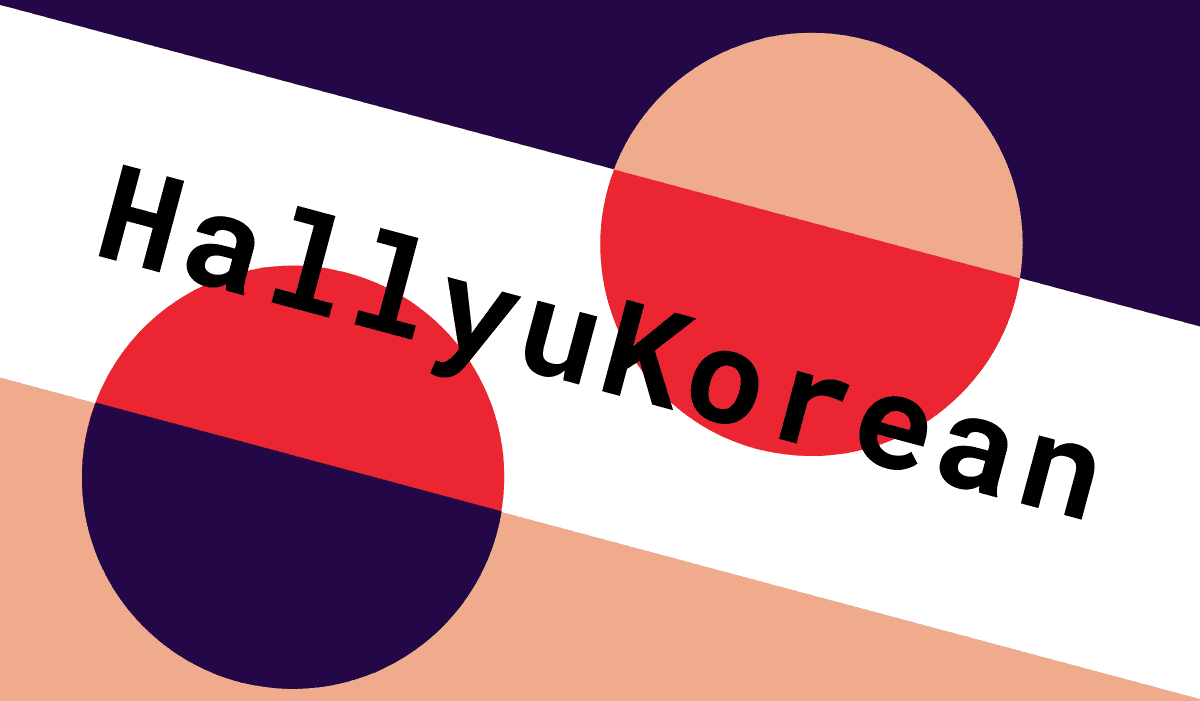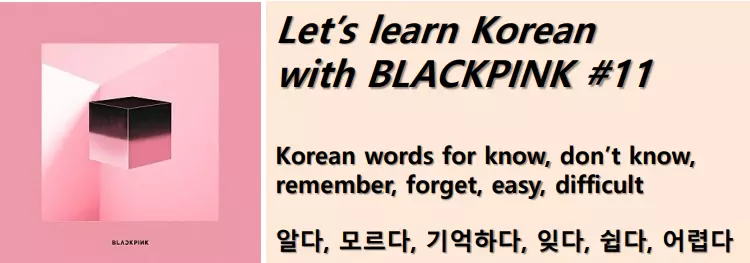Korean words for know, don’t know, remember, forget, easy, difficult : 알다, 모르다, 기억하다, 잊다, 쉽다, 어렵다
Let’s learn Korean words for know, don’t know, remember, forget, easy, difficult with BLACKPINK lyrics.
Click the play button below to listen to all the BLACKPINK lyrics used in this post.
알다 [al-da] to know
굳이 말 안 해도 다 알잖아
gu-ji mal an hae-do da al-ja-na
I don’t have to say anything, you know everything
*굳이(strongly) +
말(talk) +
안(not) +
해도(하다(do) + ~도(even if)) +
다(all) +
알잖아(알다(know) + 잖아(as you know))
(*This sentence has no subject.
It’s important to note that while English sentences require a subject, Korean sentences often omit the subject.
The omitted subject can be identified in the context of the dialogue or writing.
~잖아(요) reminds the listener of something or rebukes the listener indirectly.
~잖아(요) is the same as ‘as you know’, ‘didn’t I say that~’ in English.)
모르다 [mo-reu-da] to not know
나도 날 모르겠어
na-do nal mo-reu-ge-sseo
I don’t even know myself
*나(I) + 도(too) +
날(I(나) + 를(object particle), =날) +
모르겠어(don’t know)
기억하다 [gi-eok-ha-da] to remember
내가 누군지 까먹었니? 똑바로 기억해
nae-ga nu-gun-ji kka-meo-geot-ni? ttok-ba-ro gi-eo-kae
Have you forgotten who I am? Remember straight
*내가(나(I) + 가(subject particle), =내가) +
누군지(누구(who) + 이다(to be) + ㄴ지(connective ending), =누군지) +
까먹었니?(forgot?) +
똑바로(straight) +
기억(memory) + 해(do)
(*ㄴ지 is a connective ending used to indicate an ambiguous reason or judgment about the following statement.
In some cases, nouns can be turned into verbs by simply adding the verb 하다 (to do, to be).
하다 [hada] (to do) is the dictionary form and there are several conjugations of 하다 in Korean.
1)해라[haera] 2)해[hae] 3)해요[haeyo] 4)하십시오[hasipsio]
해요, 해 are informal and are usually used in everyday conversation.
The politeness level is 1 < 2 < 3 < 4.
해요, 해 can both be used as imperative or declarative depending on the context.)
잊다 [it-tta] to forget
널 잊을 수가 없어
neol i-jeul su-ga eop-seo
I can’t forget you
*널(너(you) + 를(object particle), =널) +
잊을 수가(잊다(forget) + ~을 수(dependent noun)) + 가(subject particle)) +
없어(don’t have)
(*’Verb stem + ~ㄹ 수 있다’ means ‘can’ and ‘verb stem + ~ㄹ 수 없다’ means ‘can’t’.)
쉽다 [swip-tta] to be easy
쉬운 [swi-un] easy
쉽게 [swip-ge] easily
복잡한 게 아니야. 쉽게 생각해
bok-ja-pan ge a-ni-ya. swip-ge saeng-ga-kae
It’s not complicated, think easy
*복잡한(복잡하다(be complicated) + ㄴ(noun modifier)) +
게(것(thing) + 이(subject particle), 게) +
아니야(not) +
쉽게(easy) +
생각(thought) + 해(do)
(*’Adjective stem + ~게’ makes an adjective into an adverb.)
어렵다 [eo-ryeop-tta] to be difficult
어려운 [eo-ryeo-un] difficult
어렵게 [eo-ryeop-ge] with difficulty
그만 생각해. 뭐가 그리 어려워?
geu-man saeng-ga-kae. mwo-ga geu-ri eo-ryeo-wo?
Stop thinking. What’s so hard about this?
*그만(stop) +
생각(thought) + 해(do) +
뭐(what) + 가(subject particle) +
그리(so) +
어려워?(be difficult)
(*뭐 is the shortened form of 무엇. 무엇 is a noun and 뭐 is an adverb or a noun.
무슨 also means ‘what’, but it’s an adjective, so you can use it if you have a noun after it.)
Grammar Reference
*Noun+하다 : verb
Many Korean nouns that indicate or describe an action or behavior can be combined with 하다 to form verbs.
In some cases, nouns can be turned into verbs by simply adding the verb 하다 (to do).
ex)기억해 : 기억(memory) + 해(do)
생각해 : 생각(thought) + 해(do)
*Tense
*Present tense : Adjective/verb stem + ~아/어/해요
*Past tense : Adjective/verb stem + ~았/었/했어요
*Future tense : Adjective/verb stem + ~(으)ㄹ 거예요 / ~ㄹ 게요/ ~겠어요
The basic way to get the verb/adjective stem is to remove 다 from the verb/adjective.
If there is a vowel ㅏ or ㅗ on the final syllable of the adjective/verb stem, 아요(present tense), 았어요(past tense), 을 거예요(future tense) is used.
If there is a vowel other than ㅏ or ㅗ on the final syllable of the adjective/verb, 어요(present tense), 었어요(past tense), ㄹ 거예요(future tense) is used.
Also, if there is 하다 in the adjective/verb, 하다 changes to 해요(present tense), 했어요(past tense), 할 거예요(future tense).
Below you can see the conjugation of 알다, 모르다, 기억하다, 잊다, 쉽다 by tenses.
| Present tense | Past tense | Future tense | |
| 알다 | 알아요 | 알았어요 | 알 거예요 |
| 모르다 | 몰라요 | 몰랐어요 | 모를 거예요 |
| 기억하다 | 기억해요 | 기억했어요 | 기억할 거예요 |
| 잊다 | 잊어요 | 잊었어요 | 잊을 거예요 |
| 쉽다 | 쉬워요 | 쉬었어요 | 쉬울 거예요 |
| 어렵다 | 어려워요 | 어려웠어요 | 어려울 거예요 |
*Speech levels
The three most commonly used Korean speech levels are 합쇼체 (formal polite), 해요체 (informal polite) and 해체 (informal plain).
*The formal polite style : Adjective/verb stem + ~(스)ㅂ니다
~(스)ㅂ니다 is used more in formal or public situations including the military, news, reporting presentations, meetings and lectures. It’s mainly used to address large gatherings or people you don’t know personally.
*The informal polite style : Adjective/verb stem + ~아/어/해요
~아/어/해요 is most commonly used in everyday life. Compared to the formal polite style, the informal polite style is softer and less formal, so it is mainly used among family members, friends, shopkeepers and other close acquaintances.
*The informal plain style : Adjective/verb stem + ~아/어/해
As for the informal plain style ~아/어/해, it is mainly used among friends from superiors to people of lower rank and among family members.
Below you can see the conjugation of 알다, 모르다, 기억하다, 잊다, 쉽다 by speech levels.
| Formal polite | Informal polite | Informal plain | |
| 알다 | 압니다 | 알아요 | 알아 |
| 모르다 | 모릅니다 | 몰라요 | 몰라 |
| 기억하다 | 기억합니다 | 기억해요 | 기억해 |
| 잊다 | 잊습니다 | 잊어요 | 잊어 |
| 쉽다 | 쉽습니다 | 쉬워요 | 쉬워 |
| 어렵다 | 어렵습니다 | 어려워요 | 어려워 |

